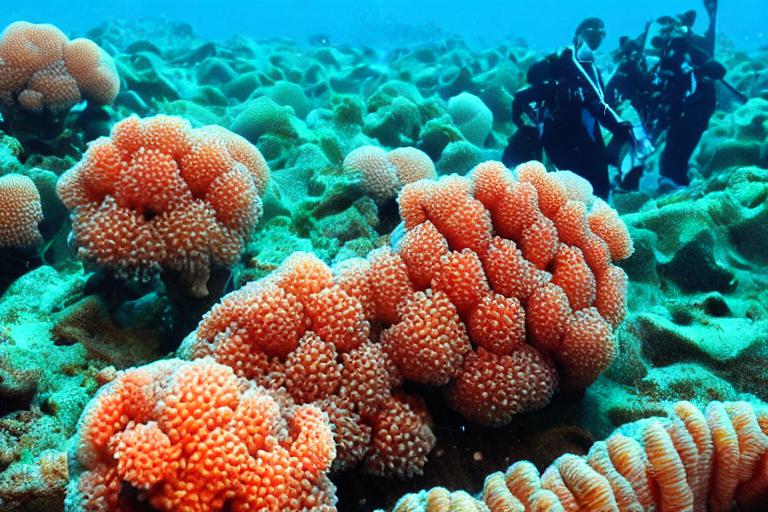Coral reefs are some of the most biodiverse ecosystems on Earth. They are also an important food source for many people. But can you eat coral?
Coral is made up of calcium carbonate, which is the same material that makes up our bones and teeth. When coral is eaten, it can help to replenish calcium stores in the body.
Coral is a delicacy in many parts of the world, and it is considered a health food in China. In the Philippines, coral is often used in soups and stews.
Coral is not typically found in grocery stores in the United States, but it can be purchased online or at specialty seafood markets.
If you are thinking about trying coral, it is important to research the source to make sure it is sustainable and not overfished. Coral reefs are already under threat from climate change and other human activities, so it is important to be mindful about our impact on these delicate ecosystems.
Is It Safe to Eat Coral?
Coral is also a popular food source in many cultures. Coral is a type of marine invertebrate that forms a hard skeleton. It is an important part of the marine ecosystem and provides a home for many fish and other marine creatures.
Coral is made up of calcium carbonate, which is also found in eggshells and seashells. When coral is consumed, the calcium carbonate is broken down and absorbed by the body.
However, it is important to avoid consuming coral that has been exposed to pollutants, such as oil or sewage. There are no known health risks associated with eating coral.
Coral is a nutritious and delicious food source that can be enjoyed by humans without any health risks. If you are interested in trying coral, be sure to purchase it from a reputable source and avoid any that has been exposed to pollutants.

Can You Cook and Eat Coral?
Coral is a type of marine invertebrate that is related to both anemones and jellyfish. It is a calcium carbonate skeleton that is secreted by coral polyps. Coral can be found in a variety of colors, including white, pink, orange, red, and purple.
However, some cultures do consume coral for its purported health benefits. Coral is not typically eaten by humans, as it is very difficult to digest. It is also thought to boost the immune system and help with wound healing. Coral is said to be a good source of calcium, magnesium, and potassium.
Coral is a delicate ecosystem and is very sensitive to changes in the environment. It is important to be mindful of this when considering whether or not to eat coral. Overfishing, pollution, and climate change are all major threats to coral reefs. If you do choose to eat coral, be sure to only purchase it from a sustainable source.
Coral Mushrooms Can Cause a Mixup
Coral mushrooms are a type of sea coral that is edible for humans. However, they can cause a mixup because they can be confused with other types of coral that are not edible.
Coral mushrooms have a white or cream-colored body with red or orange bumps. They can grow up to 12 inches tall and are found in warm, shallow waters.
Coral mushrooms are not the only type of coral that is edible for humans. Other edible corals include brain coral, fire coral, and staghorn coral. However, these other types of coral are not as easily confused with non-edible coral.
However, be sure to correctly identify them before you eat them to avoid a mixup. Coral mushrooms can be a delicious and healthy addition to your diet.
Coral Calcium Is a Health Supplement
Coral calcium is a health supplement that can be found in many health food stores. It is made from the exoskeletons of marine animals and is a source of calcium and other minerals.
Coral calcium has many health benefits, including preventing osteoporosis, reducing the risk of heart disease, and improving joint health. It also helps to boost the immune system and improve digestion.
Coral calcium is safe for most people to take, but it is important to speak to a healthcare provider before starting any new supplement.
Fish Eat Coral, so Why Can’t Humans?
Coral is a popular food source for fish, but can humans eat coral too?
Coral is made up of tiny animals called polyps that live in colonies. The coral reef is the largest living structure on Earth and is made up of coral.
Coral is not poisonous to humans, but it is not a common food source either. The main reason why humans don’t eat coral is because it is very difficult to harvest.
Coral is a valuable resource for fish and other marine life. Humans can benefit from coral reefs as well, but we need to be careful not to overfish them. It provides shelter and food for many species of fish.
Are Soft Corals Toxic to Humans?
While soft corals are not toxic to humans, they can cause irritation if they come into contact with your skin. If you are planning on eating coral, it is best to cook it first to kill any harmful bacteria.
Coral is a popular ingredient in many Asian dishes, and is often used in soups and stir-fries. It has a slightly crunchy texture and a mild, sweet flavor. If you are looking for a unique culinary experience, why not give coral a try?
Do Humans Eat Sea Anemone Living Near Coral?
Sea anemone are often found in tropical waters near coral reefs and can range in size from a few inches to over a foot long. They are usually a bright color and have a column-like body with tentacles surrounding their mouth. Though sea anemone living near coral may not look like the most appetizing meal, there are some who believe that they are edible for humans.
However, there is no scientific evidence to support these claims and it is not recommended that humans eat sea anemone. Some believe that sea anemone are a good source of protein and can be cooked in a variety of ways. These creatures are often host to a variety of toxins and parasites that could be harmful to humans if ingested.
Why Do People Consume Coral Calcium?
It is a popular supplement that is taken by people in order to improve their health. Coral calcium is a type of calcium that is found in coral reefs. There are many benefits of coral calcium, including the fact that it can help to improve bone health, reduce the risk of cancer, and boost the immune system.
Coral calcium supplements are often recommended for people who are at risk for osteoporosis and other bone-related diseases. These minerals are essential for the proper functioning of the human body. Coral calcium is also a good source of magnesium, potassium, and zinc.
There are some concerns about the safety of coral calcium supplements, but most experts agree that they are safe for most people. The best way to get the most benefit from coral calcium is to take it in supplement form.
What Does Coral Do to Your Body?
Finally, coral can help to improve your digestion. The calcium in coral helps to break down food and absorb nutrients more efficiently. For one, coral helps to improve the quality of your skin. The calcium in coral helps to fight off infection and disease. Coral contains a lot of calcium, which is essential for keeping your skin looking young and healthy. Coral is a beautiful ocean creature that has a lot of benefits for humans. Additionally, coral can help to improve your immune system.
What Animals Eat Coral?
The coral polyp is a simple creature with a sac-like body and a mouth surrounded by tentacles. Coral is a type of marine invertebrate that is related to anemones and jellyfish. Coral polyps are the primary structure of a coral reef and are what give coral its characteristic shape.
Coral polyps extract nutrients from the water around them using their tentacles. In return, the coral polyp provides the zooxanthellae with a place to live and protection from predators. The zooxanthellae live inside the coral polyp and provide it with food in the form of glucose and other organic compounds. They are able to do this because they have a symbiotic relationship with algae called zooxanthellae.
Other animals that eat coral include some species of crabs, sea urchins, and certain types of worms. The most well-known coral-eating animal is the parrotfish. Coral is not typically thought of as food for animals, but there are a few animals that do eat coral. Parrotfish use their strong beaks to break off pieces of coral and then grind up the coral with their teeth to eat the zooxanthellae.
While animals may eat coral, humans are not typically advised to do so. This is because coral is often covered in bacteria and other microorganisms that can cause disease in humans. In addition, the high levels of calcium in coral can interfere with the absorption of other minerals in the human body.
Sources
They are home to a wide variety of plant and animal life, including many that are edible for humans. Coral reefs are some of the most diverse ecosystems on Earth.
Coral is composed of calcium carbonate, which is why it is often used in supplements and as a food additive. It is also a good source of iodine, which is essential for human health.
It is important to be aware of these before consuming any coral. While most coral is safe to eat, there are some types that can be poisonous.
Some of the most popular edible coral species include brain coral, finger coral, and staghorn coral. These can be found in many different parts of the world and are often harvested for their culinary and medicinal value.
If you are interested in trying coral, be sure to do your research and only purchase it from a reputable source.
Frequently Asked Questions
1. Can you eat coral?
Yes, sea coral is edible for humans. The taste has been described as similar to that of a clam.
2. What are the health benefits of eating coral?
Coral is a good source of calcium and other minerals. It also contains a number of compounds that may have health benefits, including antioxidants and anti-inflammatory compounds.
3. Are there any risks associated with eating coral?
Coral can contain high levels of mercury and other toxins. It is important to only eat coral that has been tested and found to be safe.
4. How can you prepare coral for eating?
Coral can be cooked or eaten raw. It is often used as an ingredient in sushi.
5. Where can you buy coral?
Coral is not widely available for purchase, but it can sometimes be found in Asian markets or online.
Final thoughts
Coral is a beautiful and unique addition to any aquarium, but can you eat coral? Is sea coral edible for humans?
Coral is not edible for humans, and in fact, eating coral can be dangerous. Coral is full of toxins that can cause nausea, vomiting, and diarrhea. Eating coral can also lead to coral reef destruction, as it damages the delicate ecosystem.
If you’re looking for a unique and beautiful addition to your aquarium, coral is a great option. But be sure to admire it from a distance – eating coral is not worth the risk.
